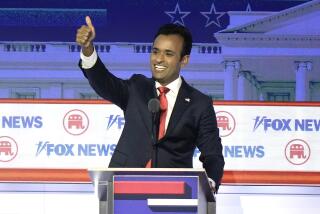North’s Turnabout Has Roots in Nixon’s Ground
- Share via
Lt. Col. Oliver L. North has managed one of the greatest political role reversals in recent American history. It was a remarkable turnabout--from being the reclusive, enigmatic villain in the Iran- contra affair to being the hard-working, earnest and honest victim of a foreign policy gone bad. Even more remarkable was his accomplishing this in less than one week. How did he do it?
At a nonverbal level, North’s posture, halting hand gestures, direct eye contact and disapproving facial animation often combined to create the image of a parent admonishing a child. With a face that might have come from a Norman Rockwell painting, and a military uniform replete with appropriate decorations, North was able to convey the larger-than-life quality that we ordinarily reserve for heroes.
North’s voice, which was direct and unhesitant, also cracked with appropriate passion at the correct times, helping to forge this image. Indeed, by the end of the week he looked and sounded like a young Jimmy Stewart leading a filibuster against a corrupt Congress in “Mr. Smith Goes to Washington.”
The real key to North’s approach, however, had its roots in American political history. Indeed, to truly comprehend North’s transformation we must look back 35 years to a television address made by another government official whose veracity had been challenged.
The year was 1952, and the official was the Republican candidate for vice president, Congressman Richard M. Nixon. Despite having the good fortune to be coupled with a sure winner in Dwight D. Eisenhower, Nixon’s candidacy was suddenly threatened by the disclosure that he kept a “slush fund” of $18,000. To exonerate himself, Nixon purchased a half-hour of prime-time television and stepped into America’s living rooms to explain his side of the controversy. Public reaction was overwhelmingly favorable--so much so that Eisenhower came to see him as a political asset rather than a liability.
Like North, Nixon was a formidable advocate and an accomplished speaker who also used nonverbal communications skills to project a positive image. The genius of Nixon’s approach, however, rested in the clever crafting of his argument.
We can see the same genius in Oliver North. Like Nixon before him, North has carefully used themes and values--honesty, honor, family and patriotism--that are both popular and difficult to dispute. When we hear North referring to himself in the third person, declaring that he never took a penny of the Iran-contra money for himself, we can hear Nixon reading his financial statement, declaring that the only money that he had ever taken was a loan from his parents, which he repaid--with interest. When we hear North asserting his love for country and his fear of the spread of communism--and, perhaps most cleverly, his fear of sending American troops to Central America--we can hear Nixon talking about his wartime service in the Navy and his concern about communists in Washington. When we hear North declaring his love for his wife and admitting that he wrote a check from the account in question at a lingerie store to buy leotards for his little girls, we can see Pat Nixon, in her “respectable Republican cloth coat,” seated beside her husband while he admits accepting a small cocker spaniel dog named Checkers as a gift for his children.
The result, in both instances, was predictable. North, like Nixon before him, presented himself as an average American, imbued with ordinary values, placed in an extraordinary situation. In essence, North said to Americans that he was just like them, and that, given his situation, they might have done the same thing. It is this sense of common ground that gives North his greatest credibility.
What is disturbing about this is the way in which it has been received. So caught up are we in euphoria over his dramatic presentation that we have failed to ask the more critical questions. The fact is that North’s testimony left many serious questions about our foreign policy and our system of checks and balances unanswered. In similar fashion, Nixon’s television tour de force left many questions unanswered in 1952.
The legacy of “the Checkers speech,” however, should remind us that we must never be swayed by style over substance--that regardless of how one answers the harder questions, they are questions that must be asked. This message was clear to people two decades after Checkers, when in the last months of a crumbling Administration Richard Nixon sought to explain his way out of Watergate. The Checkers strategy worked once for him; it would not work twice. One wonders how history might have been different if someone had bothered to ask critical questions in 1952, instead of waiting until 1974.
In looking at Oliver North, it is a lesson worth keeping in mind.
More to Read
Get the L.A. Times Politics newsletter
Deeply reported insights into legislation, politics and policy from Sacramento, Washington and beyond. In your inbox twice per week.
You may occasionally receive promotional content from the Los Angeles Times.










